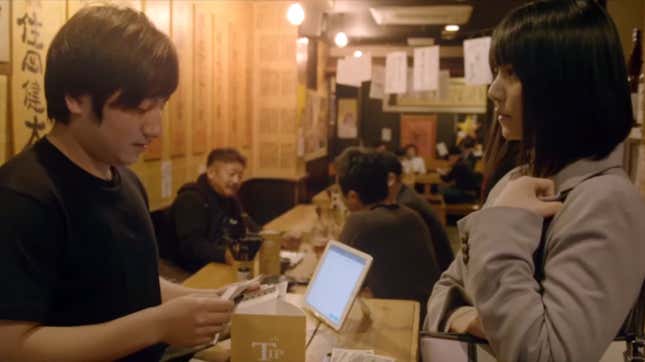
In Japan, tipping is basically not a thing. There are a few occasions where one does tip, such as at a ryokan, or a traditional Japanese inn. But generally, good service is expected minus tips. So if you go to a restaurant, the price on your bill is what you pay. One Japanese company is trying to change that.
“If you are from a country where tipping is routinely practiced, it may come as a surprise that there is no such culture in Japan,” writes the Japan National Tourism Organization. “This might be especially shocking as the standard of customer service in Japan is often regarded as the best in the world.” The practice of Japan not having a widespread tipping culture has been lauded internationally. It’s something that has been used to promote Japanese excellence and contrast with other countries.
Enter the Tip Project. This is a new Japanese enterprise aiming to introduce a tipping system into the country. The official homepage has photos of business executive and best-selling author Takafumi Horie (whom I once profiled for Wired Magazine), comedian Akihiro Nishino, and YouTuber Yoshihito Kamogashira. They seem to be the ones spearheading this effort, with the goal of it spreading throughout Japan.
The Tip Project claims that introducing the practice into restaurants will increase staff motivation and help service industries that have been hit hard by COVID-19.
But online in Japan, at least, the reaction has not been good. Below are a selection of comments from 5ch:
“Why import something bad?”
“Outside Japan, it seems that tips are given on the assumption that the base pay is low, so if that culture is copied, won’t salaries then go down?”
“Do we really think this is a good culture?”
“If tipping is introduced, then discount everything by 20 percent.”
“No thanks—this is a pain in the ass. It’ll be a pain for workers, too.”
“Guarantee standard wages. Take tips from rich people.”
“We already have something like this. Isn’t the consumption tax a tip to the government?”
“I’m glad Japan doesn’t have this culture. I don’t want this pain-in-the-ass tradition.”
“Since I don’t understand why anyone would want this culture, if rich people in Japan want to tip, it’s fine if they want to.”
“If people want to pay [a tip], that’s fine, but why are these unrelated folks [at the Tip Project] getting in the middle of that?”
“I don’t understand this at all.”
“This doesn’t suit Japan.”
The Tip Project website has a dramatization—albeit an overwrought one—of the benefits of a restaurant introducing tipping.
In the video, a restaurant server isn’t exactly living up to his boss’s high standards, and doing things like checking his phone while cleaning up. A young businesswoman comes to the restaurant with senior co-workers and, in a voice-over, talks about how she has difficulty putting her feelings into words. The server notices she’s cool and offers her a blanket. The woman is moved but doesn’t say thank you. Instead, she decides the best way to express her gratitude is with a tip. There is a long discussion at the cash register, where the server is extremely happy to get the equivalent of a seven dollar tip. The clip ends with the server being more motivated at work, and the woman better able to express herself in her own workplace.
Unlike tipping in the U.S., where customers leave cash or add an amount to their credit card, the Tip Project has customers fill out a Premium Japan Tip ticket with their name, their server’s name, and an amount—which seems way more complicated than just leaving money on the table. But that simplicity, I guess, goes against the Tip Project’s business model, which is to selling those tip tickets to restaurants. This isn’t just an effort to promote tipping—it’s a business venture. Paper documents are still widely used in Japan, so I’m guessing this company’s assumption is that restaurants will want some sort of paper trail to track tips?
The Tip Project’s official site lists over ten restaurants in Japan that have introduced this system, which, considering how many restaurants there are in Tokyo, let alone Japan, isn’t a bunch. And while the people involved, especially Horie and Nishino, are quite famous in the country, there’s already a lot of resistance to the idea of tipping being imported.